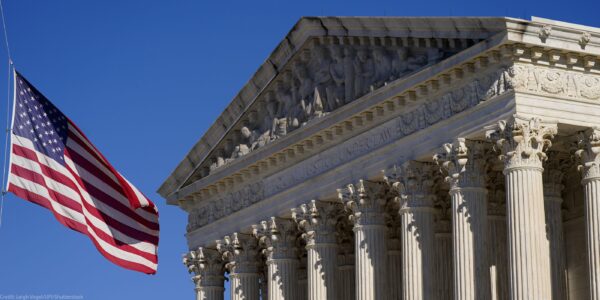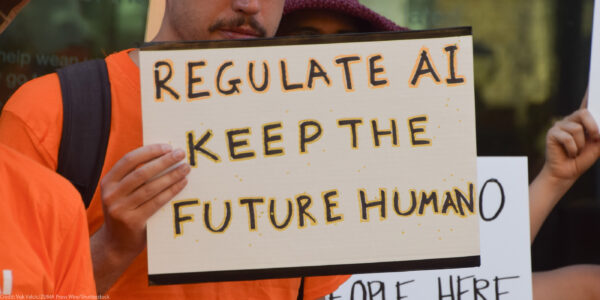Supreme Court Term Ends with Win for Trump, First Amendment Rights


The Supreme Court’s 2023-24 term will be remembered for one case above all: Trump v. United States, in which the court granted former President Donald Trump immunity from criminal liability for attempts to use his office to obstruct the peaceful transition of power after he lost the 2020 election.
At the ACLU, we submitted a friend-of-the-court brief in the case urging the justices to affirm that no person – including presidents – are above the law. And yet, the court’s six Republican-appointed justices abandoned the Constitution and its original meaning, voting instead to manufacture an immunity that effectively turns presidents into kings.
This is a court ready to create brand new constitutional protection for former President Trump, while turning away the claims of the powerless.
The justices’ ostensible justification for providing such immunity is baseless. They surmised that without knowing that they can commit crimes with impunity, presidents will be deterred from energetically doing their job. Yet, until this decision, every president faced the risk of prosecution if they committed crimes and there is no evidence that American presidents have been shy about exercising their authority. The court’s decision underscores the absolute necessity for organizations like ours to pursue constitutional checks on presidents while in office—and for voters to vote like their rights depend on it to hold presidents accountable.
While the presidential immunity case has rightfully dominated the public’s attention, the Supreme Court’s most recent term also involved many other important decisions. It issued important decisions protecting First Amendment rights, turned back a challenge to medication abortion, and addressed Second Amendment rights in a challenge to a law banning possession of guns by persons subject to domestic violence protective orders. The court also dealt several blows to our rights, denying constitutional protections for homeless people punished for sleeping in public, for Black voters subject to discrimination in South Carolina, and for an American citizen whose noncitizen husband was denied a visa without explanation.
A review of the term’s civil rights and civil liberties decisions offers a mixed picture, but make no mistake: This is a court ready to create brand new constitutional protection for former President Trump, while turning away the claims of the powerless.
In a pair of much-watched cases involving reproductive health, the court preserved access to abortion without addressing the merits of the disputes. In one case, FDA v. Alliance for Hippocratic Medicine, doctors who opposed abortion sued to challenge FDA rules that eased access to medication abortion, the most common form of abortion. The lower courts ruled against the FDA, but the Supreme Court unanimously dismissed the challenge, ruling that the doctors lacked “standing” to challenge the FDA rules because they were not personally harmed by these rules. While this is a win for medication-abortion access, the fight is far from over. Politicians have vowed to continue efforts to restrict access to abortion nationwide.
The second abortion case, Moyle v. United States, asked whether a federal law requiring emergency rooms to provide stabilizing treatment to all patients experiencing an emergency required those hospitals to provide abortions where that is the necessary treatment — even if state law forbids abortions under those circumstances. The case originated in Idaho, where state law prohibits abortion except where necessary to save the life of the mother. After a federal district court properly ruled that the federal law overrides the state ban in emergency situations, the Supreme Court intervened prematurely and paused the lower court’s ruling until it could weigh in. But after hearing arguments, the court ultimately dismissed the case, thereby resurrecting the lower court ruling protecting access to abortion in emergencies. For now, the case will continue in the lower courts.
This term the court focused on civil liberties involving the First Amendment. In National Rifle Association v. Vullo, the ACLU represented the NRA in a case arguing that New York’s top financial regulator had violated the NRA’s First Amendment when she targeted it for its political views and sought to compel banks and insurance companies to blacklist the group. The court ruled unanimously in our favor. While the ACLU often disagrees with what the NRA advocates, we defended their rights before the Supreme Court because of the First Amendment principle at stake. Had we lost this case, governors in red states would have been free to employ similar tactics against immigrants’ rights groups, gay rights groups, or the ACLU itself. The case establishes that, while government officials are free to express their views, they may not use their official authority to coerce others to punish a group for its political ideas.
The court also issued important decisions protecting free speech online. While the Internet is far from new, decades after its advent the nation is still grappling with how to approach our speech rights online. In two cases challenging Texas and Florida laws that regulated the terms by which large social media platforms moderate the content they display, the court declared, as the ACLU argued in a friend-of-the-court brief, that social media platforms, like newspapers and bookstores, have a First Amendment right to choose how to curate the content they display, sell, or publish. In another pair of online speech cases, the court ruled that where government officials speak in their official government capacity on their personal online profiles, citizens blocked from those profiles can sue to challenge their exclusion.
The term’s only voting rights case saw the six Republican-appointed justices band together to overturn a unanimous lower court decision finding that South Carolina had engaged in racial gerrymandering. In this case, in which the ACLU was counsel, along with the Legal Defense Fund and Arnold & Porter, the court sided with Republican legislators, disregarded its own precedent, and made racial gerrymandering challenges much more difficult going forward.
After a lengthy trial, a three-judge court unanimously found that South Carolina had impermissibly used race to draw the lines between two adjoining districts, to the detriment of Black voters. The mapmakers had moved more than 100,00 more voters than necessary to equalize populations across the districts. They had disproportionately relocated heavily Black neighborhoods, and the mapmakers had programmed their computers to display the racial impact of every line drawing choice. In the end, they ensured that the Black voting population did not rise above 17 percent, a ratio they considered crucial to cement a Republican advantage. The trial court found that the South Carolina legislature used race for partisan purposes when drawing their map, which the Supreme Court has long ruled is unconstitutional discrimination. In an opinion by Justice Samuel Alito, however, the court ruled that politics and race are both potential explanations for a legislature’s redistricting, and that reviewing courts must assume “good faith” even where trial courts have found that the legislators relied on race.
In an important immigration case, the court ruled that U.S. citizens have no constitutional right to object to the denial of a visa to their noncitizen spouses—even if the denial means they will be unable to live together in this country. In Dept of State v. Munoz, Luis Asencio-Cordero, a long-time partner of a U.S. citizen, sought to become a permanent resident through marriage. Under our byzantine immigration law, he had to leave the country and obtain a visa to re-enter as an immigrant. When he did so, a State Department consular officer denied his visa without any factual explanation. His partner, Sandra Muñoz, sued, saying that in light of the burden on her marriage, she had a right to know the basis for the denial so that they could respond.
This was not an unreasonable or unprecedented claim. The court had previously held, that where the denial of a visa infringes on U.S. citizens’ constitutional rights, the government’s visa denial must at least be based on a “facially legitimate and bona fide” reason. Muñoz argued that a citizen’s right to live with her spouse in her home country ought to be grounds for protection. But in another 6-3 ruling, the court ruled that she had no right whatsoever.
By the same 6-3 vote, the court ruled that the Eighth Amendment’s prohibition on “cruel and unusual punishments” does not bar punishing homeless people for sleeping in public, even when they have nowhere else to go. In Grants Pass, Oregon v. Johnson, the U.S. Court of Appeals for the Ninth Circuit reasoned that punishing someone without a home for sleeping outside was “cruel and unusual” because it punished them for the status of being homeless. Justice Neil Gorsuch, writing for his conservative colleagues, rejected that claim and concluded that the Grants Pass law punishes the conduct of sleeping in public, not the status of being homeless. But to be homeless is to have nowhere to sleep. As Justice Sonia Sotomayor wrote in dissent, “Sleep is a biological necessity, not a crime.”
Even as this term ends, the court has already agreed to hear two important cases next term in which the ACLU is counsel. The first, United States v. Skrmetti, is a constitutional challenge to Tennessee’s ban on gender-affirming care for minors. Tennessee is one of many states that have in recent years intruded upon the medical autonomy of parents, children, and their doctors by banning gender-affirming care, expressly because it is designed to depart from, rather than conform to, the individual’s sex assigned at birth. The ACLU has challenged these laws, arguing that they violate equal protection by discriminating on the basis of sex and gender identity. They also intrude on the rights of parents to decide what is best for their children. In the second case, Free Speech Coalition v. Paxton, the court has agreed to hear whether the First Amendment bars Texas from requiring adults to submit digital identification to obtain access to websites containing constitutionally protected sexual speech.
Today’s Supreme Court is a challenging forum. That’s why the ACLU has launched our State Supreme Court Initiative to advance and protect civil rights and civil liberties under state constitutions, which can be more protective than the U.S. Constitution. But as this term illustrates, we can still win important victories in the federal courts — including the Supreme Court. One thing should remain clear: the ACLU will never stop fighting, in every forum available, for your rights and liberties, and for a more just America.
Stay informed
Sign up to be the first to hear about how to take action.
By completing this form, I agree to receive occasional emails per the terms of the ACLU's privacy statement.
By completing this form, I agree to receive occasional emails per the terms of the ACLU's privacy statement.



